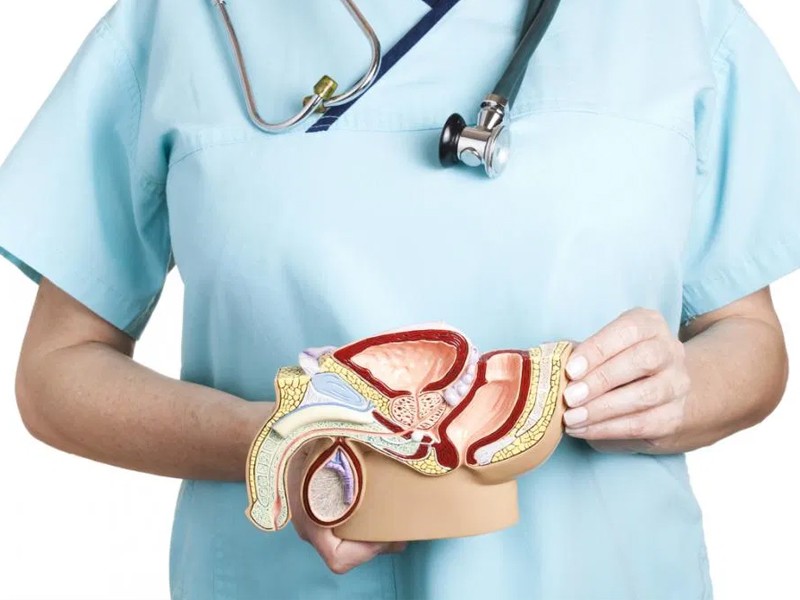Varicocele

Until recently, it was believed that a sterile marriage is usually due to a woman’s health problems. But modern research shows that male infertility accounts for approximately 45-49% of all cases. It can be associated with many diseases of the male reproductive system, but one of the common diseases associated with infertility is varicocele.
What is varicocele?
Varicocele is a rather serious disease that develops due to the expansion of the veins of the spermatic cord. Usually the left testicle is affected, due to its anatomy. The pathology develops gradually, is characterized by a violation of the outflow of blood from the scrotum with the testicles, due to disturbances in the system of the valves of the veins and, as a result, the elasticity of the vessels is lost. Quite often, the disease begins asymptomatic and can develop over several years. It is often diagnosed in the initial stages in boys aged 14-16, during routine checkups.
There are primary (idiopathic) and secondary (symptomatic) varicoceles. The second usually develops as a result of violations in the inferior vena cava.
Depending on the manifestations, it is divided into the following stages:
- 0 degree. It is not symptomatic, palpation changes are absent. It is possible to identify the disease during instrumental studies, for example, Doppler ultrasound or ultrasound.
- 1st degree. Palpation can determine the changed veins during muscle tension and in a standing position.
- 2nd degree. It is possible to visually identify varicose veins, but without dysfunction of the testicles and changes in their size.
- 3d degree. The enlarged veins are visible with the naked eye, a clear dysfunction of the testicles.
This is a rather dangerous disease, and not just a cosmetic defect. Due to the expansion of the veins, the amount of blood around the testicle increases, and accordingly the temperature in the scrotum rises, which directly affects the formation of sperm and its quality. And as a result, male infertility develops.
Why does varicocele occur?
The main reasons for the development of varicocele include:
- Genetic. A very popular reason that is diagnosed is the tendency to varicose veins, which is inherited. It manifests itself as congenital weakness of the vascular wall and is usually accompanied by varicose veins of other veins, such as the lower extremities.
- Constant physical activity associated with heavy lifting. Increases stress on the valves and vein walls, which wear out and expand over time. It is usually a concomitant provoking factor, not the cause of the development of the disease.
- Congenital anatomical abnormalities, accompanied by bends and compressions on the veins and spermatic cords.
- Tumor-like neoplasms, press on the wall of the veins. Due to a decrease in the lumen of the vessel, the outflow of blood worsens and over time the vein expands.
- Increased body weight, obesity. It is quite a common cause of all varicose veins, including varicocele.
- Chronic inflammation of the testicles can also be a factor in the development of varicocele.
- Lack of regular sex life. Sexual intercourse promotes full blood circulation in the vessels of the testicles and penis, allowing you to keep the vessels in a regular tone. Its absence reduces blood flow and can also be a factor in the development of the disease.
How does varicocele manifest?
It is worth noting that at the initial stages the disease does not manifest itself in any way. Many men live with her for a long time and even have children. But sometimes, one of the factors can provoke the active development of the disease and the appearance of the first symptoms.
Pain in the testicles. One of the first symptoms that a man experiences during the development of the disease. Pulling pain, a feeling of heaviness in the scrotum, which appear during physical exertion, intercourse or thermal procedures (sauna). The pains go away at rest and lying down. But with the development of the disease, the pain becomes permanent and brings severe discomfort.
Violation of intercourse. Very often, varicocele causes a lack of erection. This is directly related to the fact that an erection requires full blood flow.
The development of infertility. Varicocele causes the temperature in the testicles to rise and thus the number and quality of sperm are reduced. Accordingly, the chances of fertilization are reduced. Sometimes this may be the only symptom and the disease is diagnosed when a couple goes to the doctor with infertility and does not even suspect that the husband has a serious illness.
How is varicocele diagnosed?
First of all, the doctor examines and palpates the testicles and scrotum. Sometimes already at this stage, he may suspect the development of the disease. But to confirm the diagnosis, instrumental diagnostic methods are prescribed.
- Ultrasound of the scrotum. On the screen, the doctor can see anatomical changes in the spermatic cord, neoplasms that press on them, or the dilated veins themselves.
- Doppler ultrasonography of blood vessels. During this examination, varicose veins, their anatomical changes and blood flow in the testicles are seen.
Also, all men with suspected varicocele are advised to take a spermogram to test the quality of sperm.
How is varicocele treated?
In the initial stages, you can try to treat with conservative methods, and first of all, remove the cause of varicocele. For example, the treatment of inflammatory processes of the spermatic cord and testicles.Also credited with wearing a suspensor (support band), it is recommended to wear tight underwear and avoid physical activity.
But unfortunately, this will not help if the vessels have dilated and the existing varicose changes. In this case, surgical intervention is required.
There are many types of surgery that can be done for varicocele. Today, the most popular are minimally invasive treatments. With the help of laparoscopic equipment, the dilated veins are ligated through small incisions. On average, such an operation does not last long and after 1-2 days a man can go home.
Sclerotherapy of veins is also actively used. A special medical solution is injected into the varicose vein, which glues its wall and, as a result, the vein stops functioning. Usually, the entire procedure lasts up to one hour and does not require a hospital stay.
It must be remembered that the doctor chooses the method of treatment based on the stage of the disease and the spread of the process, the patient’s age and the individual characteristics of the organism. Also, after any method of treatment, one should refrain from lifting heavy weights, avoid overheating, and treat all other dilated veins.
Prevention of varicocele
Of course, it is much easier to prevent a disease than to cure it. Therefore, there are many preventive recommendations for people at risk and all men in general.
First of all, you need to remember about regular, but moderate physical exercise, this maintains the health of the body as a whole. Avoid heavy lifting and coprostasis (constipation), this leads to tension in the abdominal muscles and, as a result, increased pressure in the veins. Regular intercourse helps to improve blood flow in the genitals of a man and keeps blood vessels in good shape, sometimes it even slows down the development of the disease in the initial stages.
You also need to remember about the regular preventive examination of the doctor, because it is easier to treat the disease in the initial stages.


